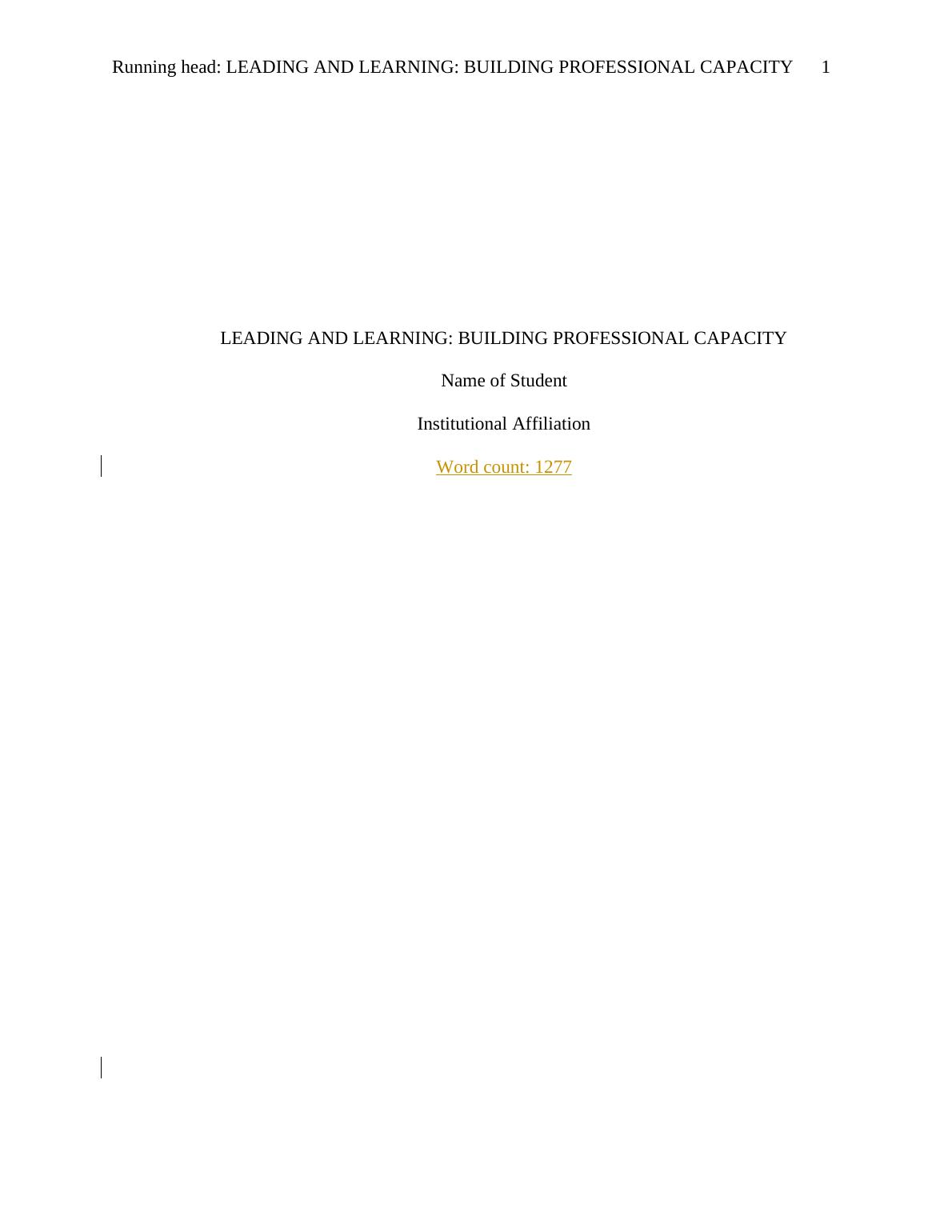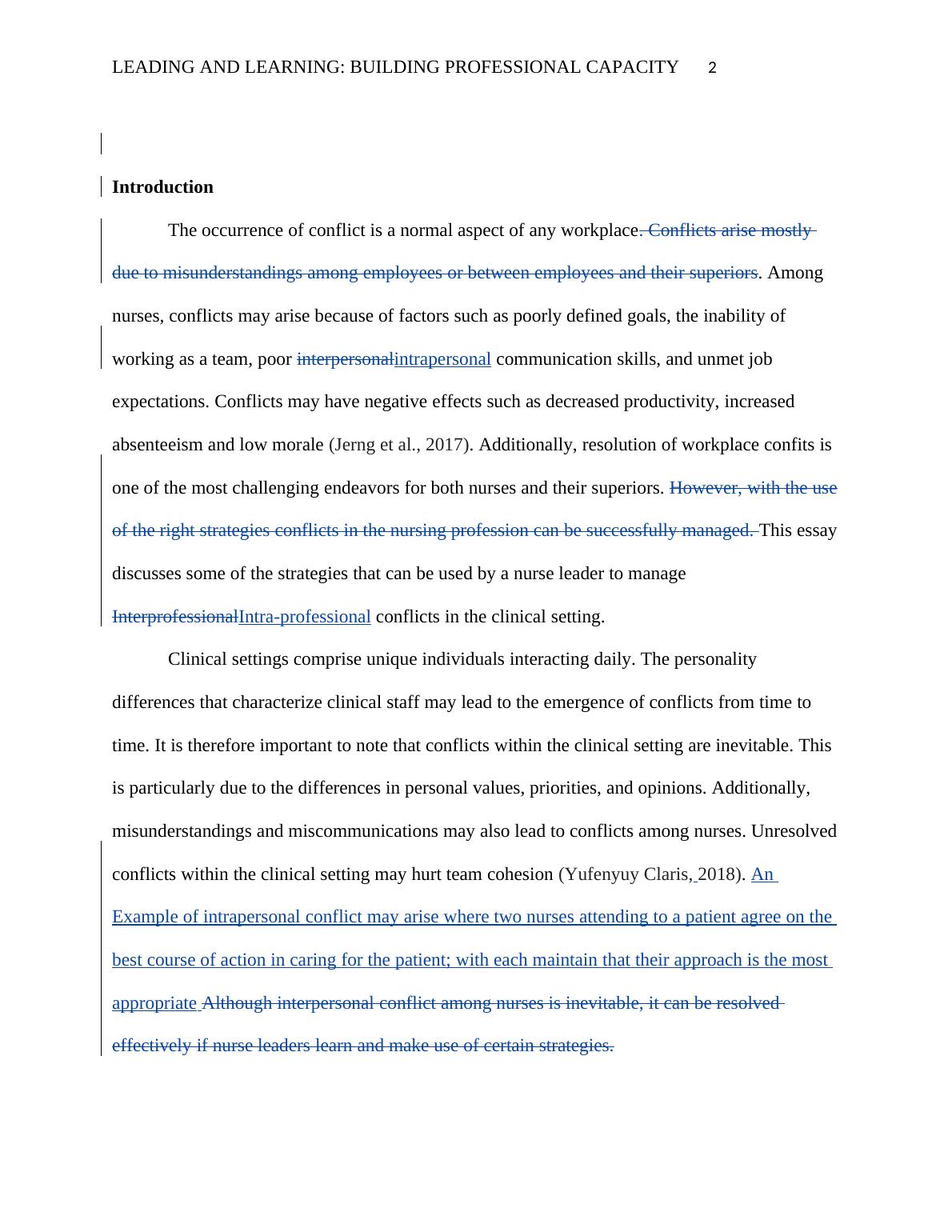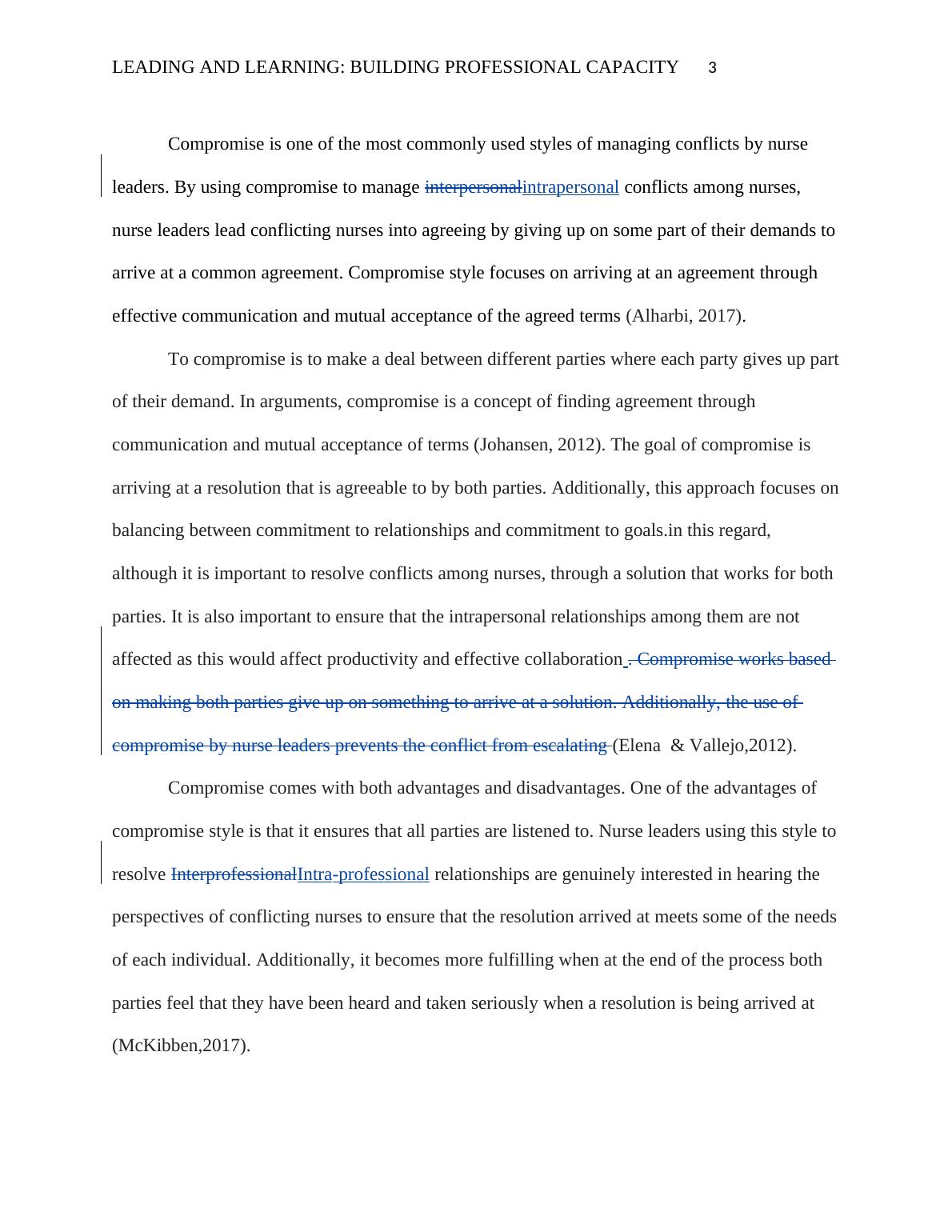Conflict Management Styles of Nurse Managers
Added on 2022-09-17
8 Pages1864 Words16 Views
Running head: LEADING AND LEARNING: BUILDING PROFESSIONAL CAPACITY 1
LEADING AND LEARNING: BUILDING PROFESSIONAL CAPACITY
Name of Student
Institutional Affiliation
Word count: 1277
LEADING AND LEARNING: BUILDING PROFESSIONAL CAPACITY
Name of Student
Institutional Affiliation
Word count: 1277

LEADING AND LEARNING: BUILDING PROFESSIONAL CAPACITY 2
Introduction
The occurrence of conflict is a normal aspect of any workplace. Conflicts arise mostly
due to misunderstandings among employees or between employees and their superiors. Among
nurses, conflicts may arise because of factors such as poorly defined goals, the inability of
working as a team, poor interpersonalintrapersonal communication skills, and unmet job
expectations. Conflicts may have negative effects such as decreased productivity, increased
absenteeism and low morale (Jerng et al., 2017). Additionally, resolution of workplace confits is
one of the most challenging endeavors for both nurses and their superiors. However, with the use
of the right strategies conflicts in the nursing profession can be successfully managed. This essay
discusses some of the strategies that can be used by a nurse leader to manage
InterprofessionalIntra-professional conflicts in the clinical setting.
Clinical settings comprise unique individuals interacting daily. The personality
differences that characterize clinical staff may lead to the emergence of conflicts from time to
time. It is therefore important to note that conflicts within the clinical setting are inevitable. This
is particularly due to the differences in personal values, priorities, and opinions. Additionally,
misunderstandings and miscommunications may also lead to conflicts among nurses. Unresolved
conflicts within the clinical setting may hurt team cohesion (Yufenyuy Claris, 2018). An
Example of intrapersonal conflict may arise where two nurses attending to a patient agree on the
best course of action in caring for the patient; with each maintain that their approach is the most
appropriate Although interpersonal conflict among nurses is inevitable, it can be resolved
effectively if nurse leaders learn and make use of certain strategies.
Introduction
The occurrence of conflict is a normal aspect of any workplace. Conflicts arise mostly
due to misunderstandings among employees or between employees and their superiors. Among
nurses, conflicts may arise because of factors such as poorly defined goals, the inability of
working as a team, poor interpersonalintrapersonal communication skills, and unmet job
expectations. Conflicts may have negative effects such as decreased productivity, increased
absenteeism and low morale (Jerng et al., 2017). Additionally, resolution of workplace confits is
one of the most challenging endeavors for both nurses and their superiors. However, with the use
of the right strategies conflicts in the nursing profession can be successfully managed. This essay
discusses some of the strategies that can be used by a nurse leader to manage
InterprofessionalIntra-professional conflicts in the clinical setting.
Clinical settings comprise unique individuals interacting daily. The personality
differences that characterize clinical staff may lead to the emergence of conflicts from time to
time. It is therefore important to note that conflicts within the clinical setting are inevitable. This
is particularly due to the differences in personal values, priorities, and opinions. Additionally,
misunderstandings and miscommunications may also lead to conflicts among nurses. Unresolved
conflicts within the clinical setting may hurt team cohesion (Yufenyuy Claris, 2018). An
Example of intrapersonal conflict may arise where two nurses attending to a patient agree on the
best course of action in caring for the patient; with each maintain that their approach is the most
appropriate Although interpersonal conflict among nurses is inevitable, it can be resolved
effectively if nurse leaders learn and make use of certain strategies.

LEADING AND LEARNING: BUILDING PROFESSIONAL CAPACITY 3
Compromise is one of the most commonly used styles of managing conflicts by nurse
leaders. By using compromise to manage interpersonalintrapersonal conflicts among nurses,
nurse leaders lead conflicting nurses into agreeing by giving up on some part of their demands to
arrive at a common agreement. Compromise style focuses on arriving at an agreement through
effective communication and mutual acceptance of the agreed terms (Alharbi, 2017).
To compromise is to make a deal between different parties where each party gives up part
of their demand. In arguments, compromise is a concept of finding agreement through
communication and mutual acceptance of terms (Johansen, 2012). The goal of compromise is
arriving at a resolution that is agreeable to by both parties. Additionally, this approach focuses on
balancing between commitment to relationships and commitment to goals.in this regard,
although it is important to resolve conflicts among nurses, through a solution that works for both
parties. It is also important to ensure that the intrapersonal relationships among them are not
affected as this would affect productivity and effective collaboration . Compromise works based
on making both parties give up on something to arrive at a solution. Additionally, the use of
compromise by nurse leaders prevents the conflict from escalating (Elena & Vallejo,2012).
Compromise comes with both advantages and disadvantages. One of the advantages of
compromise style is that it ensures that all parties are listened to. Nurse leaders using this style to
resolve InterprofessionalIntra-professional relationships are genuinely interested in hearing the
perspectives of conflicting nurses to ensure that the resolution arrived at meets some of the needs
of each individual. Additionally, it becomes more fulfilling when at the end of the process both
parties feel that they have been heard and taken seriously when a resolution is being arrived at
(McKibben,2017).
Compromise is one of the most commonly used styles of managing conflicts by nurse
leaders. By using compromise to manage interpersonalintrapersonal conflicts among nurses,
nurse leaders lead conflicting nurses into agreeing by giving up on some part of their demands to
arrive at a common agreement. Compromise style focuses on arriving at an agreement through
effective communication and mutual acceptance of the agreed terms (Alharbi, 2017).
To compromise is to make a deal between different parties where each party gives up part
of their demand. In arguments, compromise is a concept of finding agreement through
communication and mutual acceptance of terms (Johansen, 2012). The goal of compromise is
arriving at a resolution that is agreeable to by both parties. Additionally, this approach focuses on
balancing between commitment to relationships and commitment to goals.in this regard,
although it is important to resolve conflicts among nurses, through a solution that works for both
parties. It is also important to ensure that the intrapersonal relationships among them are not
affected as this would affect productivity and effective collaboration . Compromise works based
on making both parties give up on something to arrive at a solution. Additionally, the use of
compromise by nurse leaders prevents the conflict from escalating (Elena & Vallejo,2012).
Compromise comes with both advantages and disadvantages. One of the advantages of
compromise style is that it ensures that all parties are listened to. Nurse leaders using this style to
resolve InterprofessionalIntra-professional relationships are genuinely interested in hearing the
perspectives of conflicting nurses to ensure that the resolution arrived at meets some of the needs
of each individual. Additionally, it becomes more fulfilling when at the end of the process both
parties feel that they have been heard and taken seriously when a resolution is being arrived at
(McKibben,2017).

End of preview
Want to access all the pages? Upload your documents or become a member.
Related Documents
Managing Conflict Resolution 2022lg...
|8
|1961
|40
Conflicts in Clinical Nursing Discussion 2022lg...
|6
|1603
|30
Negotiationslg...
|6
|1120
|226
Solving Conflicts among Nurses Staff - Strategies and Implicationslg...
|1
|986
|463
Solving Conflicts among Nurses Stafflg...
|1
|934
|58
Project Negotiation and Conflict Management in Project Managementlg...
|16
|716
|376